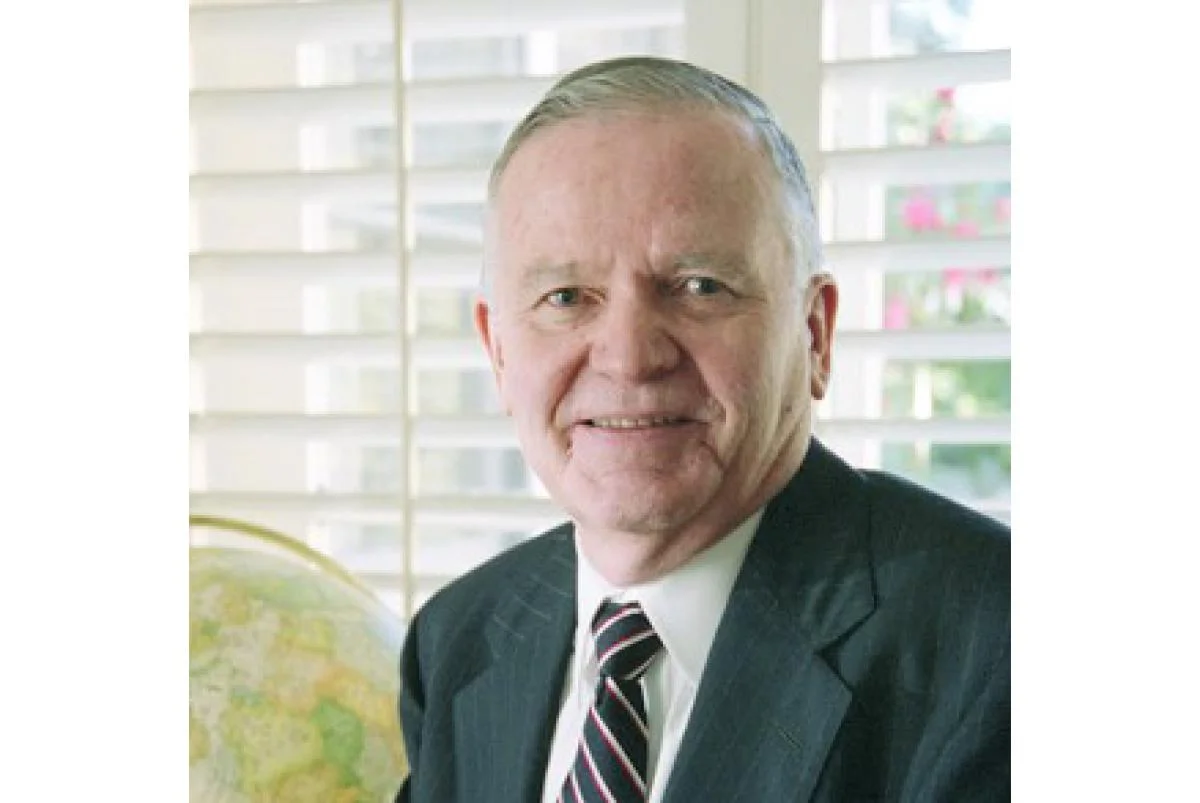EXTENDED! CO residents can apply FOR FREE through December 1st. Apply now!
Menu
EXTENDED! CO residents can apply FOR FREE through December 1st. Apply now!

By Gerald Schorin
Frederick Pardee’s visionary generosity—during his lifetime and, recently, through an estate gift that brought his total giving to just under $25 million—led to the creation of the Pardee Institute for International Futures in DU’s Josef Korbel School of Global and Public Affairs, providing a permanent home for the International Futures computer simulation model begun by Barry Hughes over 40 years ago.
Growing up in the turbulent World War II era, Pardee received several scholarships to attend college, fueling his dual mission in life: to act philanthropically and to improve the world.
After college, Pardee served in the U.S. Air Force and then worked for many years as an economic analyst. In addition to his work in quantitative modeling and economic analysis, Pardee got involved in real estate investing. He eventually founded a privately held investment and development firm, whose success allowed him to pursue his interest in advancing the human condition through systems and data and become an active philanthropist.
 When he met DU professor Barry Hughes, they connected on these shared interests. Hughes had for several years been developing IFs, which combines interconnected models across multiple domains, leveraging historical data to identify and measure trends and forecast
When he met DU professor Barry Hughes, they connected on these shared interests. Hughes had for several years been developing IFs, which combines interconnected models across multiple domains, leveraging historical data to identify and measure trends and forecast
hundreds of variables up to the year 2100 for 188 countries. The model allows researchers and policy makers to simulate how changes in one system led to changes across all others and explore how countries and regions have developed in the past, how they might grow and change in the future, and even hypothesize possible futures based on policy choices.
In 2007, Pardee provided the funding for the Korbel School to establish what was then called the Frederick S. Pardee Center for International Futures, with Hughes serving as founding director. The objective of the Center’s—now Institute’s—work was hosting and further developing Hughes’ IFs model, by then the world's leading forecasting system. Two years later, Pardee helped fund the building of an annex to Ben Cherrington Hall to house additional workspaces, video-conferencing resources and presentation capabilities.
Pardee’s generous contributions over the years led the University of Denver to award him with an honorary PhD in 2013. Pardee passed away in 2022, but his impact on the University and on improving life for millions around the world lives on and will be felt for generations.
Says Hughes, “Over 20 years, Fred Pardee and I developed a relationship combining friendship and working partnership. His strong and frequently communicated interest was always in ‘improving the human condition,’ an interest that financially and intellectually supported the creation and work of what has now become the Frederick S. Pardee Institute for International Futures. I very much miss the opportunities of further interacting with Fred."
In November 2021, Pardee Institute Director Jonathan Moyer presents research findings at UNDP Media Roundtable on Impact of War on Yemen Report III. The report explores pathways for recovery and its authors include Taylor Hannah, David K. Bohl, and Jonathan D. Moyer.
In November 2021, the Pardee Institute launched a report with USAID titled, "The Future of Food Security in the Wake of the COVID-19 Pandemic." Authors of the report include, Willem Verhagen, David Bohl, Mallory Cannon, Andres Pulido, Audrey Pirzadeh, Iris Nott, and Jonathan D. Moyer.
In barely two years, COVID-19 has set back progress in development efforts across the world and available data indicates there will likely be significant increases in extreme poverty, undernourishment, and child stunting in the coming years. But how will these effects persist, and what consequences will COVID-19 have for the future of food security?
Researchers at the Frederick S. Pardee Institute for International Futures at the Josef Korbel School of Global and Public Affairs at the University of Denver, projected the pandemic’s effects to the year 2040 on economic growth, rising inequality, rising government debt, and education losses from school closures in 2020-2025, to explore their long-term impacts on extreme poverty, undernourishment, and child stunting.
Using the International Futures (IFs) model, which focuses on long-term analysis of economic and human development conditions for 186 countries, the team compared three scenarios:
Learn more about The Future of Food Security in the Wake of COVID-19, watch a special presentation from Lead Researcher, Dr. Willem Verhagen of the Pardee Center, and learn more about his personal experience producing the report in the article Dr. Willem Verhagen and The Future of Food Security in the Wake of COVID-19.
View presentation here.
View interview with Willem Verhagen here.
In August 2021, Pardee Institute Director Jonathan Moyer and Research Associate Collin Meisel presented at the Strategic Multilayer Assessment (SMA) speaker series. The presentation was titled “China-US Competition: Measuring Global Influence." Analysis focused on China-US competition globally with a particular focus on trends and relationships in Southeast Asia by introducing the Formal Bilateral Influence Capacity (FBIC) Index, a quantitative measure of multidimensional influence between pairs of states from 1960 through 2020. The FBIC Index attempts to capture the size of interactions, as well as the reliance that one country has on others across economic, political, and security dimensions. The combination of these factors is influence capacity or relational power. Analysis shows that Chinese influence has grown in both size and reach around the world, reinforcing and contextualizing experts’ understanding of this changing international system. From the end of the Cold War to the present, Chinese influence has cut into or supplanted Western countries’ sway in every geographic region. To the extent that the United States and the West have been caught off guard by the rise of China, the “game” is not over. The United States still has many opportunities to counterbalance the expansion of Chinese influence through greater bilateral engagements and increased support for regional integration, policy prescriptions which this analysis unpacks.
Pardee Institute Research Associate Collin Meisel speaks to Denver's 9News about why a country's strong economy doesn't always translate into more Olympic medals. View the story here.
In June 2021, the World Economic Forum shared a piece titled, "China’s trade with Latin America is bound to keep growing. Here’s why that matters." Analysis was supported by Pardee Institute Assistant Director of Analysis David Bohl and may be accessed here.
In June 2021, Axios featured research by the Pardee Institute and the Atlantic Council in a piece titled, "Mapping China's growing global influence." The article may be accessed here. For the full report, please see here.
In May 2021, Pardee Institute Research Scientist Willem Verhagen published an article he co-authored in Science titled, “Balancing conservation priorities for nature and for people in Europe." The article studies how different values for nature affect conservation priorities in Europe. Specifically, the authors identify priority areas for nature conversation from a pure nature perspective, by identifying priority areas based on the distribution of 800 vertebrate species, and compare those to priority areas from a more human-oriented ecosystem services perspective on cultural values and on regulating services (such as flood regulation and carbon storage for climate change). Authors show that in general these priority areas do not overlap, but that a focus on biodiversity is most effective in capturing the full range of nature’s values. The article may be accessed here.
In June 2021, Pardee Institute Assistant Director of Research Operations Mickey Rafa, Director Jonathan Moyer, and Research Associate Taylor Hanna published with Korbel School Assistant Professor Singumbe Muyeba a piece with the Chronic Poverty Advisory Network titled, "The future of Zambian poverty to 2060: assessing national and sub-national trends across scenarios." The full article may be accessed here.
In June 2021, work completed by the Pardee Institute and the Atlantic Council titled, "Measuring Global Influence: China-US Competition in Southeast Asia and Emerging Powers in Africa," was featured by Politico Playbook. Access full report here.
Copyright ©2025 University of Denver | All rights reserved | The University of Denver is an equal opportunity institution